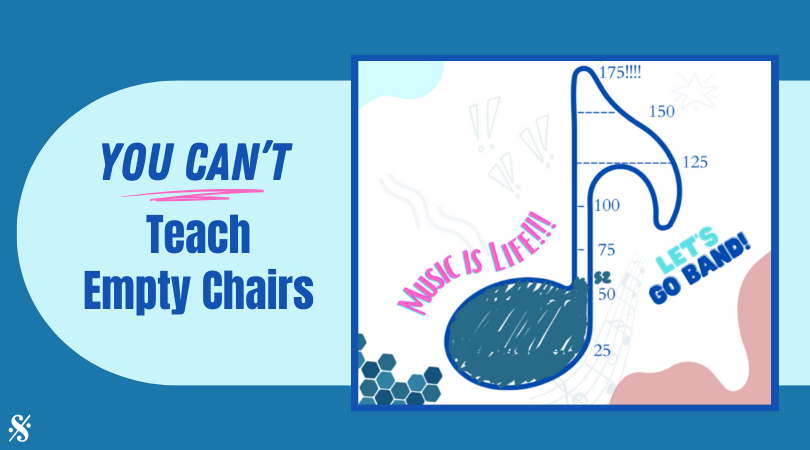This the third post in this series – the first 8 lessons can be found here and lessons 9-15 can be found here.

16. Provide your students with opportunities for individual growth. In Texas two activities supply this opportunity: TMEA auditions and UIL Solo and Ensemble contest. While these are important, be sure students are focused on the music. Competition can be a positive opportunity but it is extremely easy for young students to replace musical rewards with hardware rewards. Participating in Solo/ Ensemble contest will help young players develop confidence. Working on chamber music allows students to work on all the same concepts you are addressing daily in band rehearsal: matching style, balancing to the melody, listening to each other for tuning purposes, plus technical development—all on a much smaller scale than full band.
17. We all need to observe great teachers. How many times have you have taken a full day to observe another band director at work? No one knows better than a music teacher what it is like to feel so different from everyone else in the building. Even if there are several music teachers in your building, you are probably still the only person who teaches exactly what you teach. So you would think we would all be looking for ways to learn from one another. But we don’t. We are so dedicated to our students and our ensembles that we think they cannot function without us. Before this school year is out, take a professional day and visit a colleague. Directors never keep great teaching ideas secret—they all want to share their successes.
18. Select effective repertoire. Choose only the best quality music for your students. There is so much great music out there now. There’s also a lot that’s not as great. Be discerning. Too many of us choose repertoire that is too difficult. Inexperienced directors sometimes select music they played in high school or college, thinking they can teach it to their students. But this can become the very reason they cannot afford to invest time in conceptual teaching as they strain themselves trying to get ready for the concert. I believe that less experienced teachers should rarely perform pieces that are less than five years old. Music that has stood the test of time has done so with good reason in most cases. When you pick music for a festival, choose music that demonstrates the skills your students already possess. Don’t pick American Overture for Band because you want to develop your horns and teach your trumpets how to double-tongue. (If you want to use some particular piece to develop some skill, great. Just don’t play it for a festival.) Ensembles that are comfortable with their selections take the stage sounding confident and, for lack of a better word, prepared. If the students are still fighting notes or trying to master technique in the last few days before contest, they will be hard-pressed to sound like they have mastered it.
19. Marches are our heritage. Play one on every concert. I am alarmed at how few bands—public school and university— program marches. Besides being an important part of our history, marches are full of great teaching material, style, technique, and phrasing. If you didn’t grow up playing marches and aren’t confident teaching them, take this opportunity to seek help from a more experienced director— perhaps even a retired director who could mentor you.
After almost a half-century in this profession behind me, I can assure you I have never regretted choosing band directing as my life’s work. And while there are many more lessons to share than could ever be printed in any one article, I hope these observations can help you as you look forward to a long career in this most incredible profession!
Lessons Learned
Along with the rules offered here, these are some lessons I’ve learned that are a guide for every day:
#1: It is never too late to learn music.
#2: If you make practicing, and practice records, a part of your expectations, most students will do as you ask.
#3: Give your students opportunities to explore music outside of the classroom setting.
#4: Be careful what you say to your students. They will believe you.
#5: Things have a way of working out.
#6: Own up to your mistakes.
#7: Hold firm to your convictions.
#8: Be nice to your students. They may someday be your boss.
#9: Every student, however exasperating in class, is somebody’s “little pumpkin.”
This is the third of 3 posts that were published as an article by Barbara Lambrecht in the January 2016 Southwestern Musician. You can read the first 2 posts here and here.
Barbara Lambrecht provided this information based on a clinic she gave at the Texas Bandmasters Association Convention in 2016. We are grateful that she allowed us to reprint these many words of wisdom!
Related Reading:
Setting Goals and Achieving Objectives – Practice Tips for the Modern Musician
Choosing Literature for Success at Contest: Every Concert Has a Purpose
Teach Style First
If you would like to receive our weekly newsletter, sign up here.
Don’t forget to like us on Facebook too!
Learn. Share. Inspire.
BandDirectorsTalkShop.com






Leave a Reply
You must be logged in to post a comment.